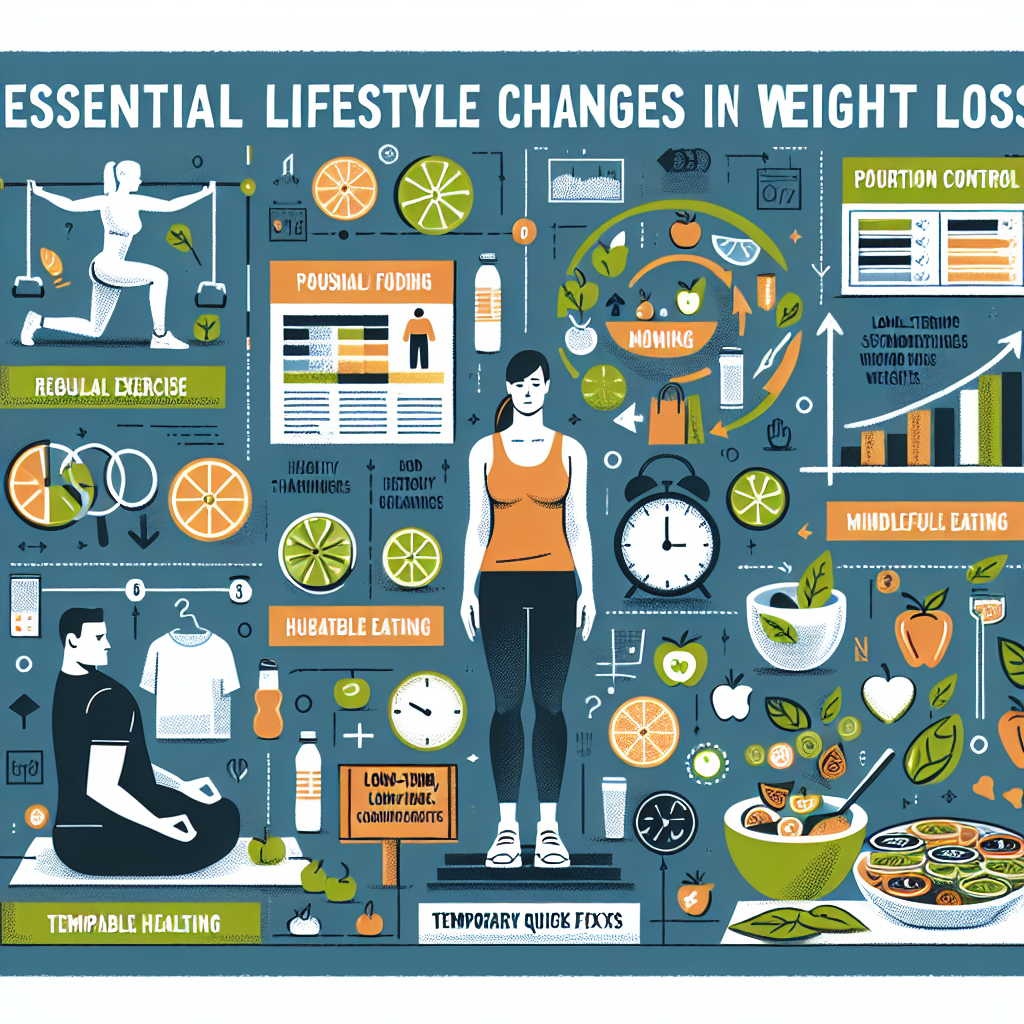If you’re on a weight loss journey, you know that it’s not just about shedding pounds, but also about making lasting changes to your lifestyle. In this article, we will explore some key lifestyle adjustments that can complement your weight loss efforts. From finding enjoyable forms of exercise to incorporating nutritious foods into your diet, these small changes can have a big impact on your overall health and well-being. So let’s dive in and discover how you can make sustainable lifestyle changes to accompany your weight loss goals.
Food Choices
When it comes to achieving your weight loss goals, making smart food choices is key. By following a healthy eating plan, practicing portion control, meal prepping, and engaging in mindful eating, you can make significant progress towards your desired weight.
1.1 Healthy Eating Plan
A healthy eating plan should focus on incorporating a variety of nutrient-dense foods into your diet. These foods include fresh fruits, vegetables, lean proteins, whole grains, and healthy fats. By choosing whole, unprocessed foods, you provide your body with the essential nutrients it needs to function optimally. It is also important to limit your intake of sugary drinks, fast food, and processed snacks, as these can contribute to weight gain.
1.2 Portion Control
Portion control plays a crucial role in weight management. It is important to pay attention to the serving sizes of the foods you consume. By using smaller plates and bowls, measuring your portions, and being mindful of your hunger and fullness cues, you can ensure that you are consuming the right amount of food for your body’s needs.
1.3 Meal Prep
Meal prepping can be a game-changer when it comes to staying on track with your weight loss goals. By preparing meals and snacks in advance, you can avoid impulsive, unhealthy food choices. Additionally, by having healthy, portion-controlled meals readily available, you can save time and reduce stress during busy weekdays.
1.4 Mindful Eating
Practicing mindful eating involves paying attention to both the physical and emotional sensations associated with eating. By eating slowly, savoring each bite, and truly enjoying your meals, you can foster a healthier relationship with food. Mindful eating also involves being aware of your body’s hunger and fullness cues, which can help prevent overeating.

Physical Activity
Incorporating regular physical activity into your daily routine is crucial for not only weight loss but also overall well-being. By engaging in various types of exercise, establishing a regular exercise schedule, incorporating strength training and cardiovascular exercise, you can enhance your weight loss efforts and improve your physical fitness.
2.1 Types of Exercise
It is important to include a variety of exercise types in your routine to promote overall fitness and prevent boredom. This can include cardiovascular exercises such as running, cycling, swimming, or dancing, as well as strength training exercises to build lean muscle mass. Additionally, incorporating flexibility exercises such as yoga or Pilates can help improve your range of motion and prevent injuries.
2.2 Regular Exercise Schedule
Consistency is key when it comes to reaping the benefits of exercise. Establishing a regular exercise schedule will help you stay committed and make exercise a habit. Aim for at least 150 minutes of moderate-intensity aerobic activity or 75 minutes of vigorous-intensity aerobic activity per week, along with two or more days of strength training exercises.
2.3 Strength Training
Strength training exercises not only help build and tone muscles but also increase your metabolism and promote weight loss. Incorporate exercises that target all major muscle groups, such as squats, lunges, push-ups, and rows. Start with lighter weights and gradually increase as you gain strength and confidence.
2.4 Cardiovascular Exercise
Cardiovascular exercise, also known as aerobic exercise, plays a crucial role in burning calories and improving cardiovascular health. Engage in activities that increase your heart rate, such as brisk walking, jogging, cycling, or swimming. Aim for at least 30 minutes of moderate-intensity aerobic exercise most days of the week.

Sleep and Rest
Getting enough quality sleep and incorporating periods of rest into your routine are essential for overall health and weight management. By understanding the importance of sleep, establishing a consistent sleep schedule, practicing relaxation techniques, and avoiding overtraining, you can optimize your body’s ability to recover and support your weight loss efforts.
3.1 Importance of Sleep
Sleep is often overlooked but is crucial for maintaining optimal health and weight. Lack of sleep has been linked to increased cravings for unhealthy foods, reduced motivation to exercise, and imbalanced hunger hormones. Aim for 7-9 hours of quality sleep each night to support your weight loss efforts and overall well-being.
3.2 Sleep Schedule
Establishing a consistent sleep schedule can help regulate your body’s internal clock and improve sleep quality. Try to go to bed and wake up at the same time each day, even on weekends. Avoid electronic screens and stimulating activities close to bedtime, and create a relaxing bedtime routine to signal to your body that it’s time to wind down and sleep.
3.3 Relaxation Techniques
Incorporating relaxation techniques into your daily routine can help reduce stress and promote better sleep. Try practices such as deep breathing exercises, meditation, or gentle stretching before bed to calm your mind and prepare your body for restful sleep. Experiment with different techniques to find what works best for you.
3.4 Avoiding Overtraining
While exercise is important, it is equally important to allow your body time to rest and recover. Overtraining can lead to fatigue, increased stress hormones, and impaired weight loss efforts. Be mindful of your body’s signals and give yourself regular rest days to prevent burnout and support optimal performance.
This is just the beginning of the article. Continue to expand on the remaining headings and subheadings, providing valuable insights and advice to help readers achieve their weight loss goals. Remember to maintain a friendly tone and offer helpful suggestions throughout the article.

